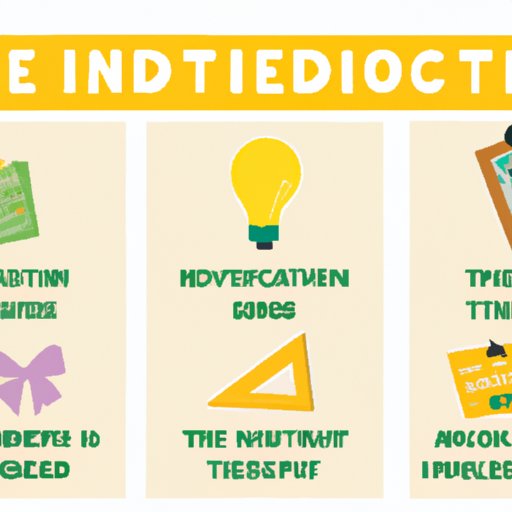
I. Introduction
Going to school and getting good grades is an essential part of building a bright future. But it’s not as easy as it may seem. Homework, tests, and exams can be daunting, and it’s common to feel overwhelmed. Finding ways to be smart in school can make a significant difference in achieving academic success. This article provides strategies, tips, and techniques that will help you level up your smartness in school.
II. The Ultimate Guide to Academic Success: Top 5 Strategies for Being Smart in School
Being smart in school takes more than intelligence. It requires creating habits, techniques, and strategies that align with academic success. Here are the top five strategies you need to apply:
Strategy 1: Time management
Time is a valuable resource that, if managed correctly, can lead to academic success. Effective time management skills will help you stay on top of your work schedule and get things done efficiently.
1. Explanation of the importance of time management
Effective time management helps students prioritize tasks, manage time efficiently, and eliminate procrastination. Managing time effectively also leads to better decision-making skills, reduced stress, increased productivity, and academic excellence.
2. Tips for effective time management
To manage time effectively, create a schedule, prioritize tasks according to their urgency and importance, eliminate distractions, and break large tasks into smaller ones. Also, use tools like to-do lists to keep you on track.
Strategy 2: Study techniques
Effective study techniques are essential when it comes to maintaining good grades. Knowing how to study properly both in and out of class sets the stage for success.
1. Explanation of effective study techniques
Effective study techniques include a mixture of reading, writing, and practice to help retain information and prepare for exams. Flashcards, outlines, and summarization are some of the proven techniques for effective studying.
2. Tips for applying these techniques
When applying these techniques, start by reviewing class material regularly and actively attempt to understand the concepts. Try practice questions and rigorously test yourself regularly to assess how much you have learned.
Strategy 3: Taking notes
Taking notes helps students retain knowledge and stay engaged during lectures. It’s also a tool for the revision process and helps make the learning process easier.
1. Explanation of why note-taking is important
Note-taking is important because it helps students actively pay attention and participate in lectures. It’s also an invaluable reference tool when studying for exams and can help students remember critical points.
2. Tips for effective note-taking
To take notes effectively, listen for main points, use shorthand where necessary, and organize your notes into key themes. Also, review your notes regularly and compare with your class notes to ensure that nothing was missed.
Strategy 4: Homework habits
Homework is a vital tool for reinforcing class material, but completing it can be a chore. Creating good homework habits can make the experience less daunting and more effective.
1. Explanation of how to establish good homework habits
Establishing good homework habits involves planning ahead, breaking assignments down into smaller pieces, and tackling the most challenging tasks first. Establish a homework routine and create a conducive environment that will allow for maximum concentration.
2. Tips for staying organized and on top of assignments
Use a planner or calendar to keep track of assignment due dates and manage time. Prioritize homework, create a designated workspace, and avoid procrastination.
Strategy 5: Test-taking strategies
Test taking requires a unique set of skills that can be honed over time. Effective test-taking strategies help reduce anxiety, increase focus and preparation, and improve test results.
1. Explanation of effective test-taking strategies
Effective test-taking strategies include reviewing material regularly, being prepared, staying focused, and managing time wisely. Learning how to read and understand the exam instructions is also essential.
2. Tips for preparing for exams
To prepare for exams, create a study schedule, review past exams and notes, and practice answering exam questions under timed conditions. Also, get enough rest before exams, and don’t cram all at once.
III. 5 Simple Tips to Boost Your Intelligence and Ace Your Exams in School
Good grades are not just about study techniques and good grades. It involves cultivating healthy habits that support consistent academic excellence. Here are five simple tips that support academic success:
Tip 1: Get enough sleep
Sleep plays a vital role in academic success. Getting enough sleep helps with memory consolidation, decision making, and more.
1. Explanation of the importance of sleep
Sleep is important for cognitive functioning, memory, fatigue reduction, and restoring energy. Subjects who get enough sleep perform better academically and have better decision-making abilities.
2. Tips for getting better sleep
To get better sleep, create a sleep schedule and stick to it, turn off electronics, avoid caffeine, exercise during the day, and practice good sleep hygiene like meditating or taking a relaxing bath before bedtime.
Tip 2: Exercise
Exercise is crucial for physical and mental well-being, including cognitive functioning, mood, and energy levels.
1. Explanation of how exercise can help improve intelligence
Regular exercise stimulates the growth of new neural pathways in the brain, improving cognitive function and memory. It also helps reduce stress and improve mood.
2. Tips for incorporating exercise into a daily routine
To incorporate exercise into a daily routine, create a schedule and set goals, find an activity that you enjoy and that suits your needs and preferences, and enlist a workout partner for extra motivation.
Tip 3: Read for pleasure
Reading for pleasure has numerous benefits that can positively impact academic performance.




